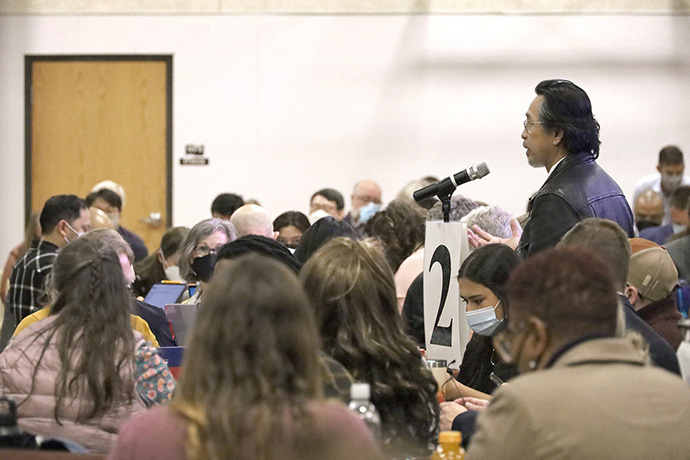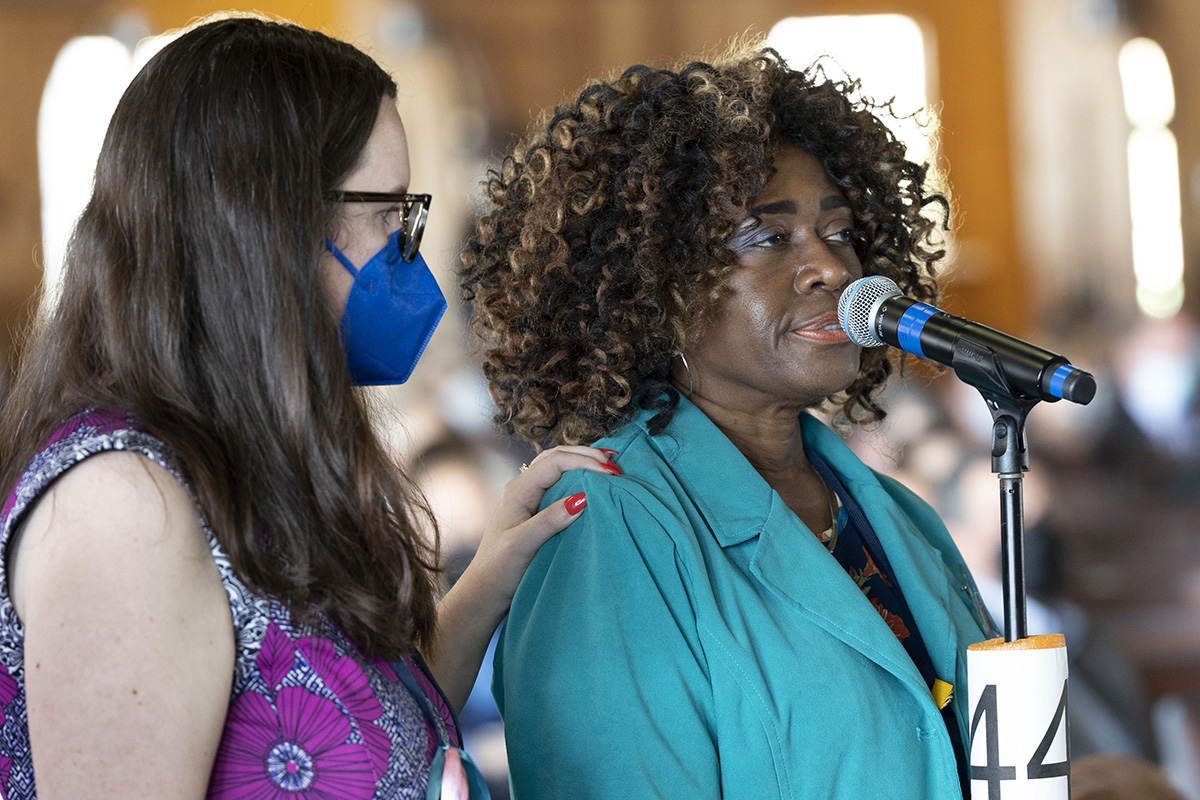Key Points:
- Both the Western Jurisdiction and Southeastern Jurisdiction found themselves addressing how bigotry has marred the bishop election process.
- The Western Jurisdiction held a highly unusual closed session and released a statement of repentance at its next business session.
- The Southeastern Jurisdiction is forming a task force to study the impact of racial bias in the nomination and selection process for bishop candidates.
Two United Methodist jurisdictions on opposite sides of the U.S. interrupted their work to grapple with racism faced by some of their bishop candidates — a problem some see embedded in the jurisdictional conference structure itself.
In a highly unusual move, the Western Jurisdiction’s delegates voted to meet in a closed session for about an hour Nov. 3 to discuss the racism, sexism and homophobia experienced by some of its diverse group of episcopal candidates.
“We repent from the harm that has been caused in our midst, in our system, and the harm that we ourselves have caused,” said a statement that delegates approved and released at the next business session on Nov. 4.
“We repent from participating in sinful rumors and repent of the ways in which we have allowed them to dwell within our body. We affirm now, and will continue to affirm, our Episcopal candidates. …”
Meanwhile, the Southeastern Jurisdiction adopted a resolution to have its committee on episcopacy create a task force to study the impact of racial bias in the nomination and selection process for bishop candidates. The task force will have more than 50% representation from under-represented groups, and it will interview former episcopal candidates to hear their experiences.
The resolution came in response to pain and frustration voiced by several candidates of color on Nov. 3, after the conference — having elected two white bishops the day before — struggled to elect its third and final bishop, the Rev. Robin Dease.
The Rev. Sharon Bowers, a Black candidate from the Holston Conference, urged the conference not to fall under “the tyranny of the white gaze” as she announced her withdrawal.
Bowers explained later that, particularly in the Southeastern Jurisdiction, everything is viewed through a specific lens, “and that lens is the white gaze.” As a result, people often can’t or won’t see problems that are going on or how systems are oppressive, she said. In addition, people of color “are operating under the constant gaze of how they should be seen or whether they should be seen at all,” she told UM News.
Subscribe to our
e-newsletter
The Rev. Sharon Austin, a Black candidate from the Florida Conference who withdrew, said the election process “is degrading, it is humiliating.” She thanked fellow Florida United Methodists for their support, but had this word of warning.
“We will never be the church that we say we want to be when we treat people of color like they are commodities that can be easily discarded or used when we need photo ops, leadership and voices of color,” she said.
The Southeastern Jurisdiction encompasses nine states in the U.S. South, most of which have struggled with the legacy of the enslavement of Black people and Jim Crow laws.
Nonetheless, that kind of pain was not limited to United Methodists in the former Confederacy. The Western Jurisdiction encompasses the 12 westernmost states in the U.S. and the territories of Guam and Saipan.
The jurisdiction, which uses the theme “Where Love Lives,” has long committed to creating a fully inclusive United Methodist Church. It prides itself on electing a number of United Methodist firsts — including the first Asian American, the first Hispanic/Latino, first African American female and the first openly gay bishop in the U.S. On Nov. 4, the jurisdiction elected the denomination’s first Filipino American bishop, the Rev. Carlo A. Rapanut.
“The assumption that here in the West, we are homogeneous and we don't have incidents of friction is not true,” said Kunle Taiwo, a Nigerian American and veteran lay jurisdictional conference delegate from what is now the Mountain Sky Conference.
This year, the Western Jurisdiction started with 32 ethnically diverse episcopal candidates, and by Nov. 3, the majority of candidates were still people of color. But bishops got wind of pernicious rumors being spread about some of the candidates.
That led the jurisdiction to take the highly unusual step of voting to close the meeting to all observers and shutting off the livestream so the delegates could discuss what was happening. At that point, the jurisdiction had yet to elect any bishops.
The Book of Discipline, the denomination’s policy book, says: “Great restraint should be used in closing meetings; closed sessions should be used as seldom as possible.”
However, the open-meetings provision does list some subjects that may be considered in closed sessions, including personnel matters. The closed session was held under the personnel exception.
During the session, delegates met in small groups to discuss the situation. Delegates told UM News that no specific rumors were discussed.
“I felt that it was a safer space to have conversation, to speak freely as conferences over the struggles that we’re having over feeling broken,” said the Rev. Allison Mark, a delegate from the California-Pacific Conference who is Chinese and Japanese American.
The Rev. Jasper Peters, African American and the first-elected clergy delegate in the legacy Rocky Mountain, now Mountain Sky Conference, said the closed session didn’t resolve things.
“But we did the important work of no longer pretending that there are no problems or pretending that we are not being shaped by the racism and sexism and homophobia that exists among us,” he said.
“We had to stop or else, those things would have continued without our active ability to at least name and try to stop doing harm.”

The. Rev. Felicisimo Santos Cao, a Filipino American delegate from the California-Nevada Conference, chairs the jurisdiction’s Inter-Ethnic Coordinating Committee that works with the jurisdiction’s ethnic caucuses. He led a prayer after the jurisdiction’s statement of repentance was released.
Cao said the closed session inspired prayer. “We need to do an act of exorcism,” he told UM News. “Exorcism is Jesus’ act of rebuking right evil, right? Because colonization is a work of evil, and we have been demonized.”
A number of people in the Southeastern Jurisdiction noted that racism was baked into the jurisdictional system, which formed in 1939 as part of the reunion that created the then-Methodist Church after a split over slavery ahead of the U.S. Civil War. The idea of regional jurisdictions was to prevent Northern bishops from leading churches in the South and vice versa. The original jurisdictional system also included the Central Jurisdiction, which segregated Black clergy and members and meant their second-class treatment in church life.
The Rev. Byron Thomas, a Black bishop candidate endorsed by the North Georgia Conference who withdrew, called out the need for “freeing ourselves of jurisdictionalism” and described the jurisdictional system as a vestige of racism.
In an interview afterward, he said the Southeastern Jurisdiction was pivotal in creating the jurisdictional system in order to protect Southern culture and to bar bishops from other regions who might come in and disrupt the segregated South. Those structures, he said, hold the church back.
“This church has demonstrated repeatedly in our systems and our structures that all the brothers and sisters are … not valued the same, and therefore they’re not treated the same,” he said.
Speaking from the floor, Thomas asked for information about efforts underway to change the regional structures of the church.
Mississippi Conference Bishop James Swanson said two pieces of legislation being sent to the 2024 General Conference, the denomination’s top lawmaking assembly, would deal with the jurisdictional system. They are the Christmas Covenant, which would organize the church into four global regions, and legislation from the Connectional Table creating a U.S. Regional Conference. Those pieces of legislation would give United Methodists in the U.S. their own regional conference, where they can address common challenges in the same way that United Methodists in the Philippines, Africa and Europe already do.
Swanson also offered a word of advice.
“I would hope that even as we consider that legislation, we will also consider our history that brought us to this point, because just doing away with the jurisdictional system is not going to do away with the vestiges of superiority that is a part of us,” he said, drawing applause. “Nor is it going to do away with my need or somebody else’s need to dominate everything.
“The easy part is legislation; the hard part will be conversion,” Swanson said. “And that is very insidious because no matter what you say, I still want to be king of the hill, and how do you get that out of me other than through conversion?”
Hahn is assistant news editor for UM News and Tanton is chief news officer of United Methodist Communications and director of UM News. Contact them at (615) 742-5470 or newsdesk@umnews.org.To read more United Methodist news, subscribe to the free Daily or Friday Digests.
Find all of UM News’s coverage of the 2022 episcopal elections of The United Methodist Church on our landing page




